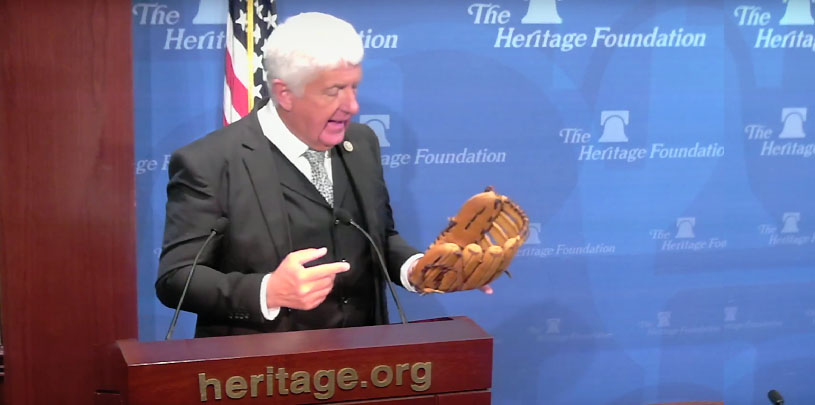
 by Tim Peterson, Utah Wildlands Director
by Tim Peterson, Utah Wildlands Director
What does Representative Rob Bishop (R-Utah) love? Dressing smartly, Dr. Pepper, and baseball. What does he hate? Protected public lands, the Antiquities Act of 1906, and Grand Staircase-Escalante and Bears Ears national monuments.
Bishop loves baseball so much that last week at the hard-right Heritage Foundation he used his baseball glove as an analogy for the Antiquities Act of 1906, the law that protects Native American cultural sites on public lands and allows presidents to create national monuments. His dad’s old glove, Bishop remarked, like the Antiquities Act, had outlived its useful life. According to Representative Bishop, a nice, new glove like his is needed, and boy did he throw a wild pitch yesterday when he introduced a bill that would essentially amend the Antiquities Act out of existence.
Limit new national monuments protected under the Antiquities Act to “object or objects of antiquity” instead of “historic landmarks, historic and prehistoric structures, and other objects of historic or scientific interest,” eliminating anything not made by humans from consideration for protection;
Create numerous size-based classifications for new monuments and rules for each, including fly-ball provisions like requirements that new monuments be at least 50 miles from any other monument, and that they be no larger than 85,000 acres, unless the designation does not prohibit activities (think mining and drilling) that damage cultural resources;
Prohibit ocean national monuments; and
Prohibit national monuments around private land inholdings without the “express written consent” of Major League Baseball, er, no… “the property owner.”
Bishop has hurled his bill like a fastball, headed for markup on Wednesday, October 11, allowing just two days for the world to read it. Were it to become law, it would set arbitrary size and timing limitations on new national monuments, unnecessarily restrict the scope of lands eligible for designation, and eliminate a president’s authority to take quick and decisive action to protect public lands at risk.
Released on Indigenous Peoples' Day, Representative Bishop’s bill also seeks to eliminate our understanding of the importance of Native American cultural objects set in the landscape by arbitrarily limiting the scope of national monuments to mere “relics” and “artifacts,” completely isolated from their context.
The bill would also remove geology, oceans, and all other “objects not made by humans” from eligibility for national monument designation. If the provisions Representative Bishop proposes had been included in the original Antiquities Act, the Grand Canyon, Zion, Bryce Canyon, Capitol Reef, and Arches (and most other national monuments) could never have been designated. His bill is an insult to our shared natural and cultural heritage and will face stiff opposition.
By attempting to severely limit the size and narrow the scope of what currently qualifies public lands to become national monuments, Representative Bishop’s bill seeks to erode one of America’s most popular and most durable conservation laws.
Rob Bishop is the chairman of the House Committee on Natural Resources, and his position brings great power. He has long voiced his disdain for the Antiquities Act, but has little to show for his irritation. For a man who loves baseball as much as Rob Bishop, this bill has had a long, herky-jerky windup, and is unsportsmanlike conduct for America’s heritage and legacy.
Thankfully, with little actual legislation passed in his long career in Congress (even now with a home-field advantage), Bishop is a grandstander and a five-o’clock hitter — he does well in practice (his committee), but not so well in the game (the floor).
The bill will likely advance out of committee this week, but let’s give it a dirt nap before it hits first base. Call your member of Congress at (202) 224-3121, and let them know that you oppose H.R. 3990, and that they should too.
80% of Arizona voters support Baaj Nwaavjo I'tah Kukveni National Monument, according to a new poll.
Read MoreUtah voters strongly support national monuments in general, and Bears Ears and Grand Staircase-Escalante in particular, a new poll shows.
Read MoreA small victory in the legal case challenging Daneros uranium mine, near Bears Ears National Monument.
Read More